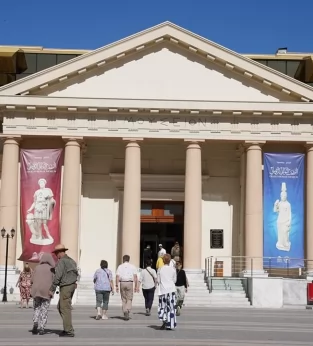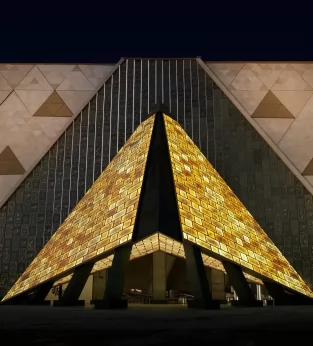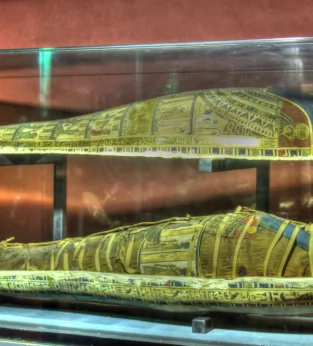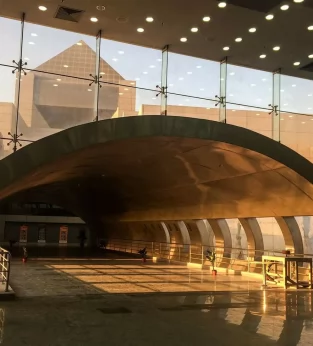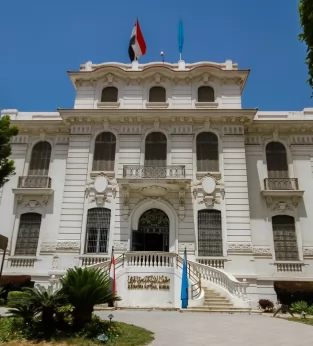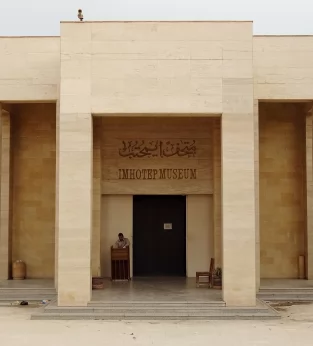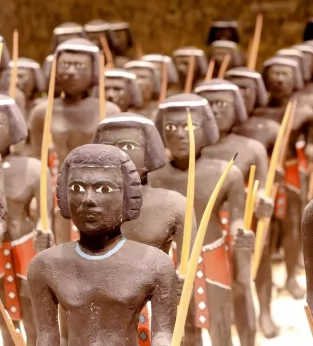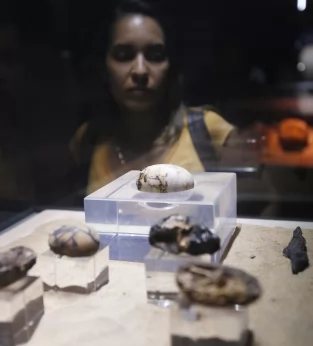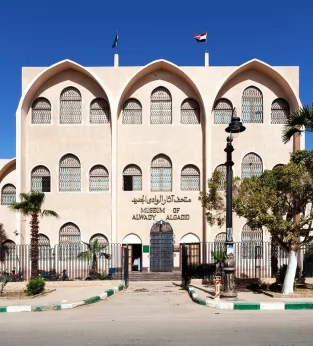The Fossil and Climate Change Museum is one of the most meaningful highlights of Wadi Al Hitan, transforming the desert into a living classroom. Opened in 2016, the Fossil and Climate Change Museum, Egypt was designed to explain Earth’s deep-time story, how climate shifts shaped oceans, landscapes, and life itself. Its scientifically curated exhibits explore the Eocene epoch, 40–50 million years ago, when this region lay beneath a tropical sea, leaving behind some of the world’s most significant whale fossils.
As part of a guided group tour, the Wadi el Hitan Museum adds essential context to the surrounding fossil trails.
Skeletons of ancient whales such as Basilosaurus reveal the evolutionary transition from land mammals to fully aquatic life, while interactive displays link past climate change with today’s environmental challenges. This is not a generic museum visit, but an educational experience that deepens understanding of climate history, fossil discovery, and why Wadi Al Hitan holds UNESCO World Heritage status.
The Fossil and Climate Change Museum is notably featured in our 14 Days in Egypt Tour. For those joining the 10-Day Tour of Egypt or the 8-Day Egypt Tour, a 1-day add-on for the standard arrival day (day 1) is available, allowing participants to visit this museum.
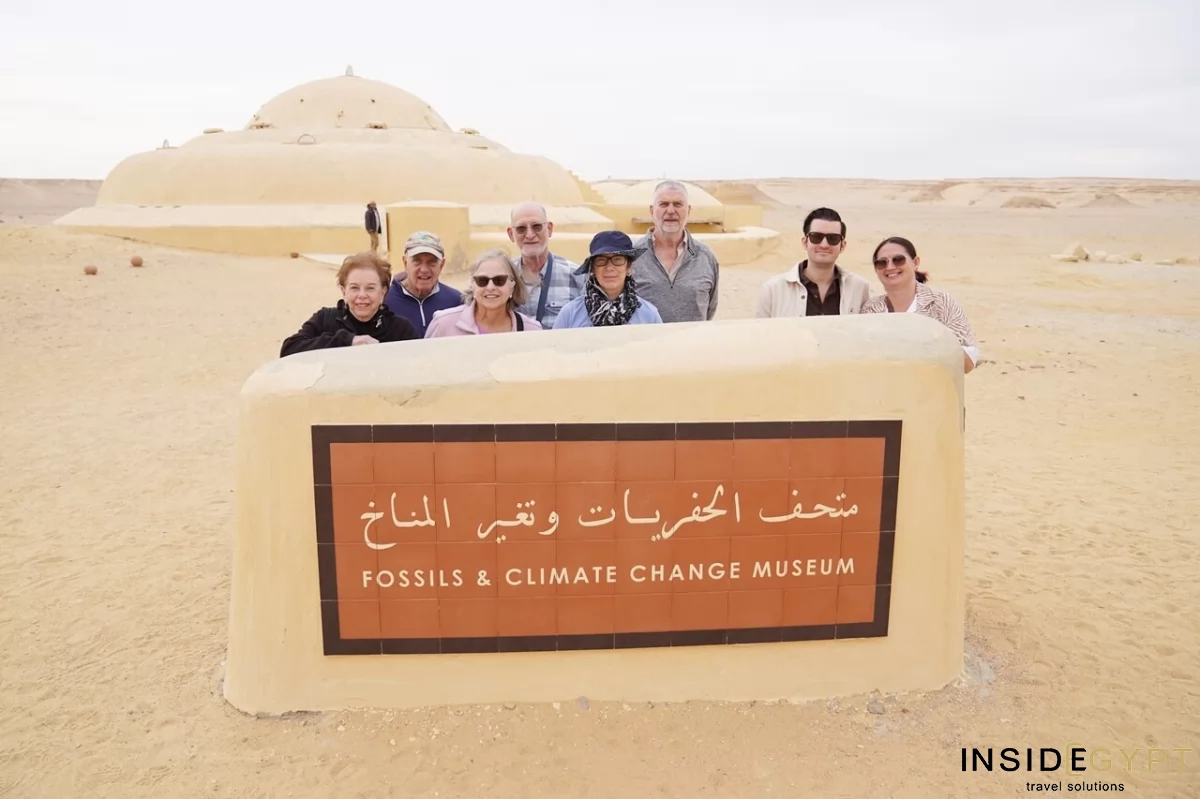
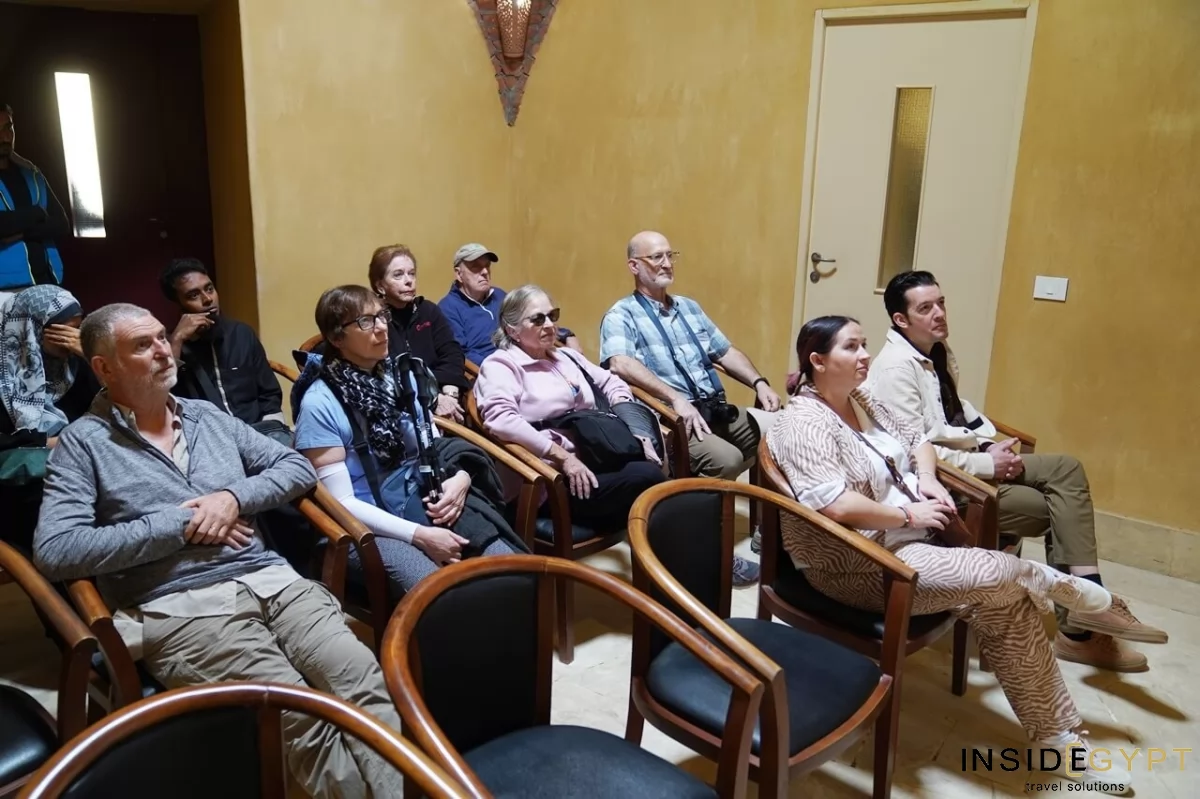
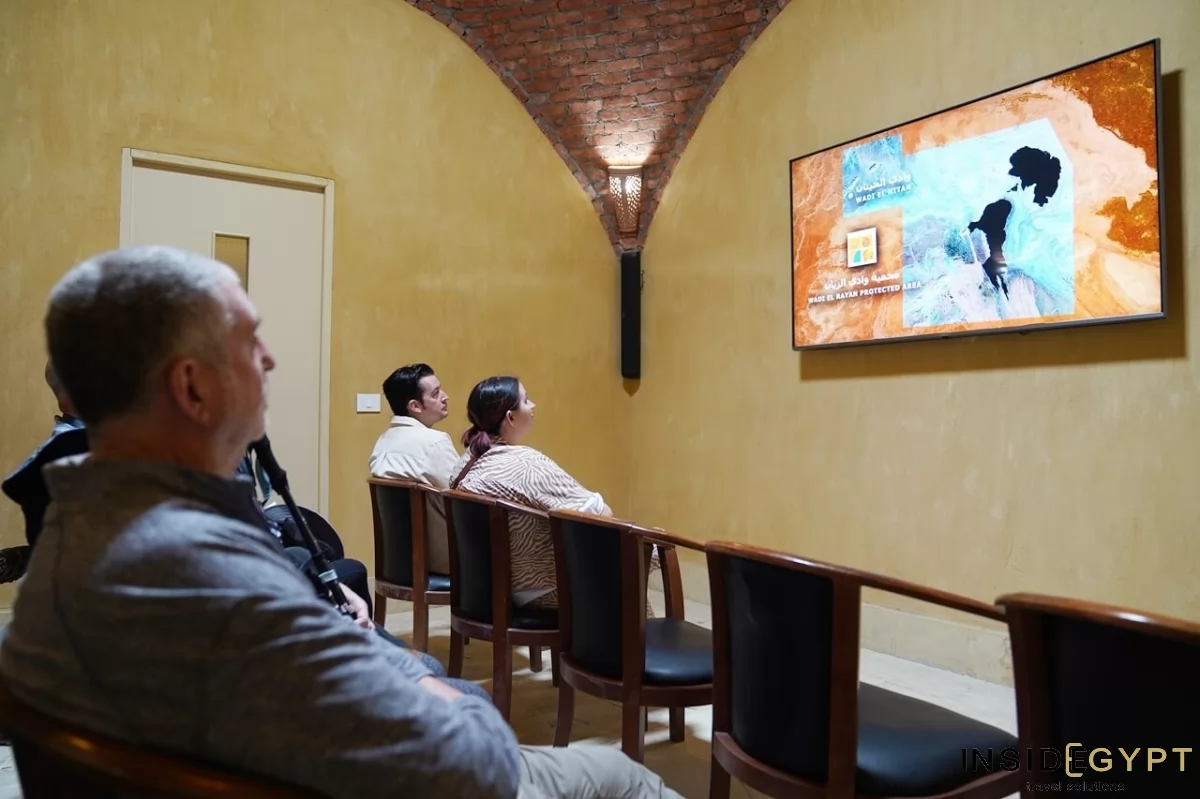
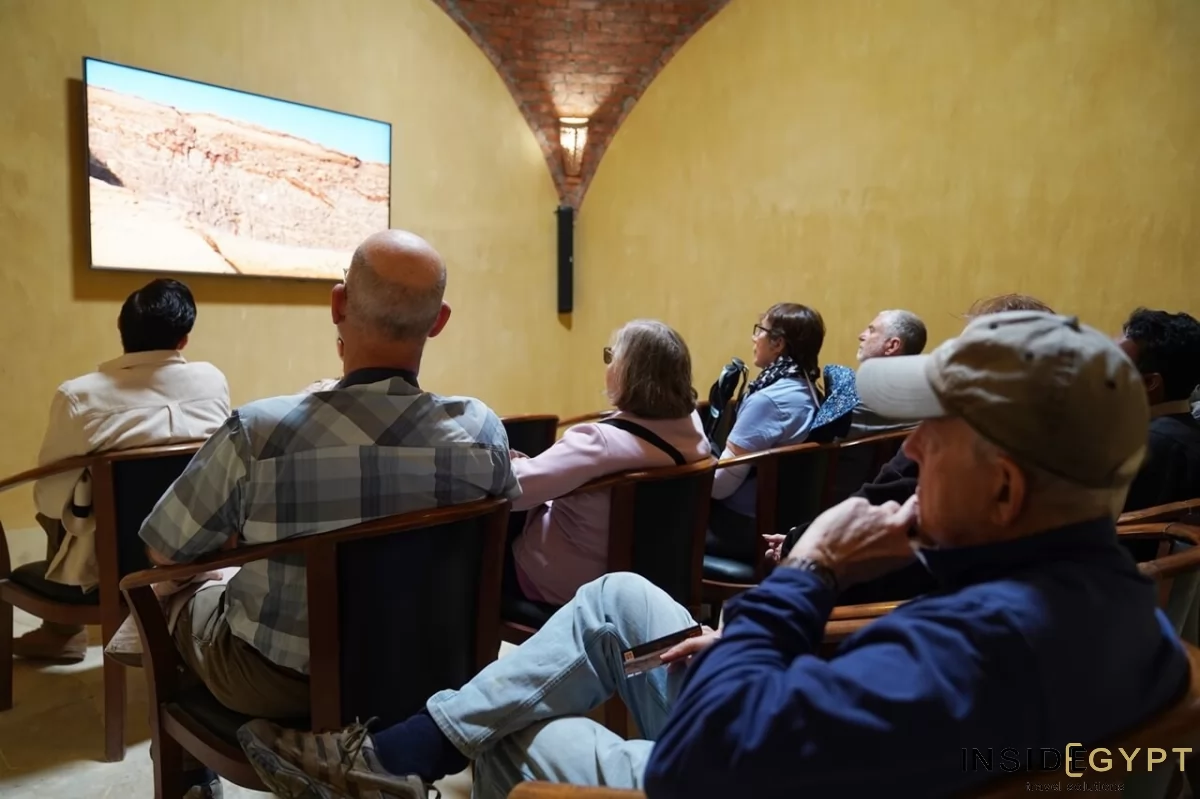
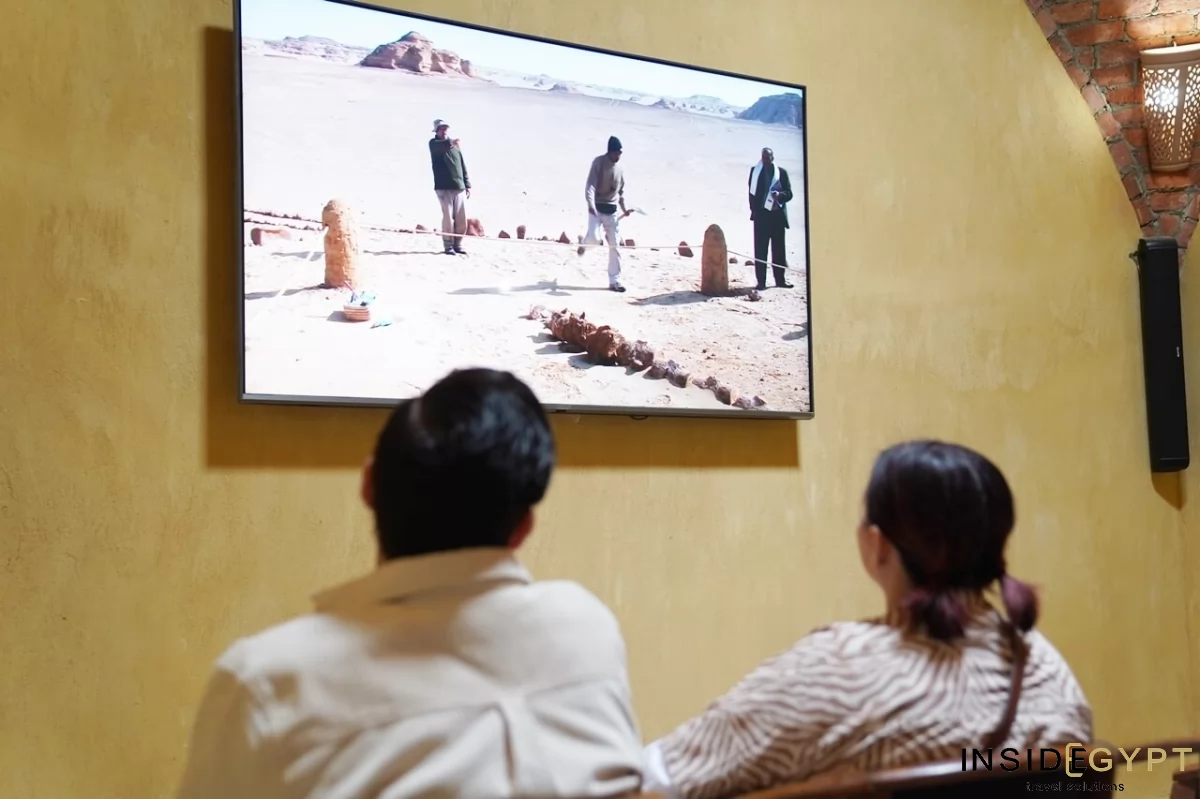
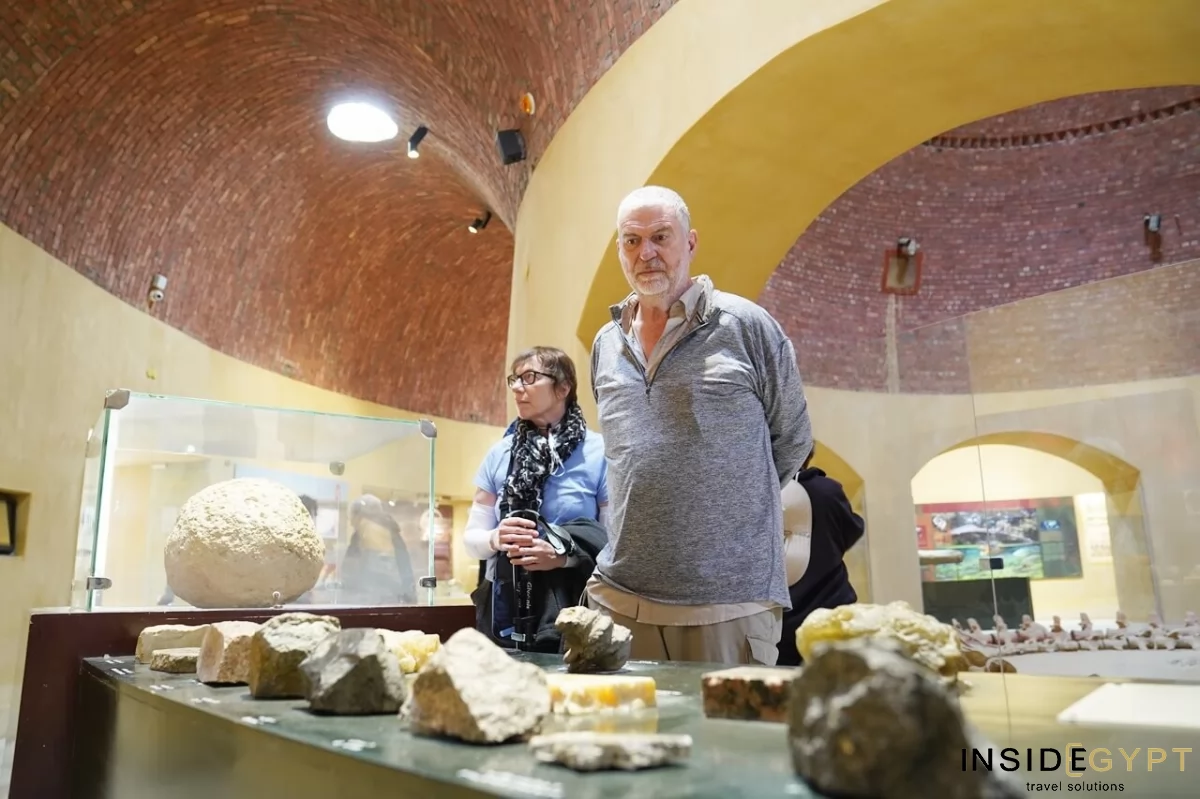
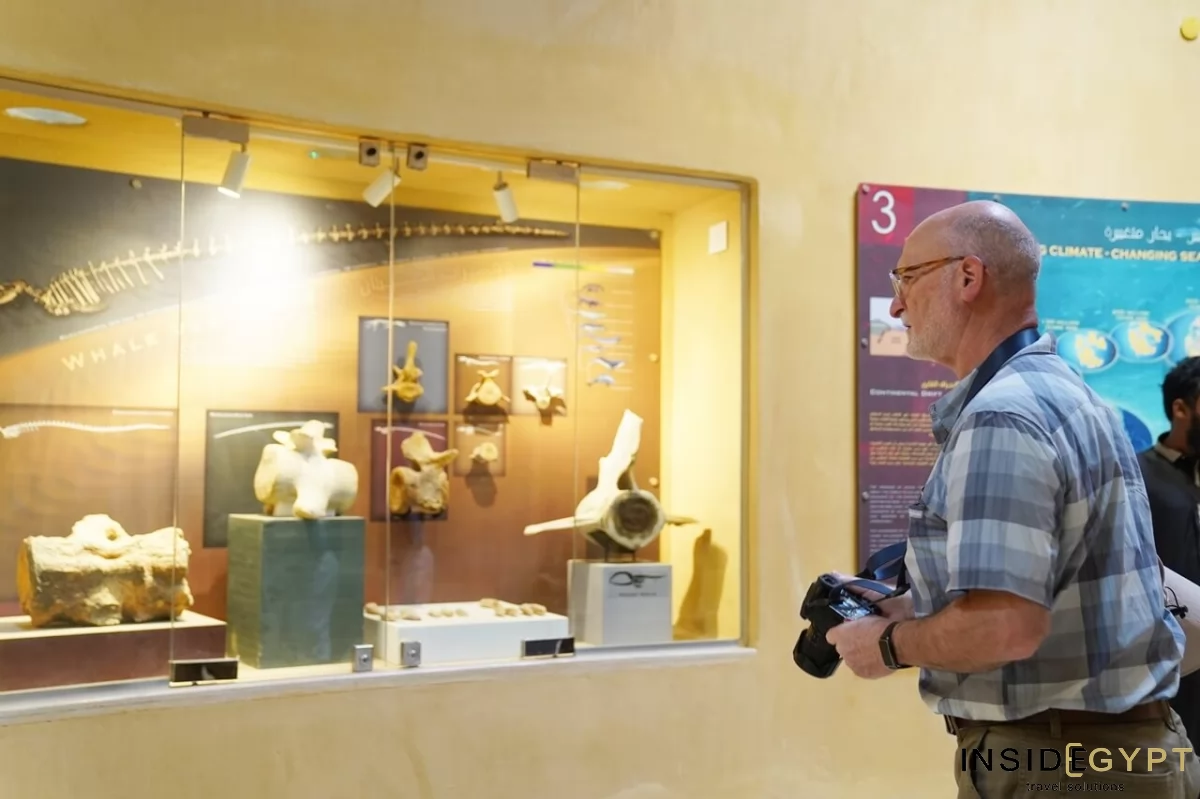
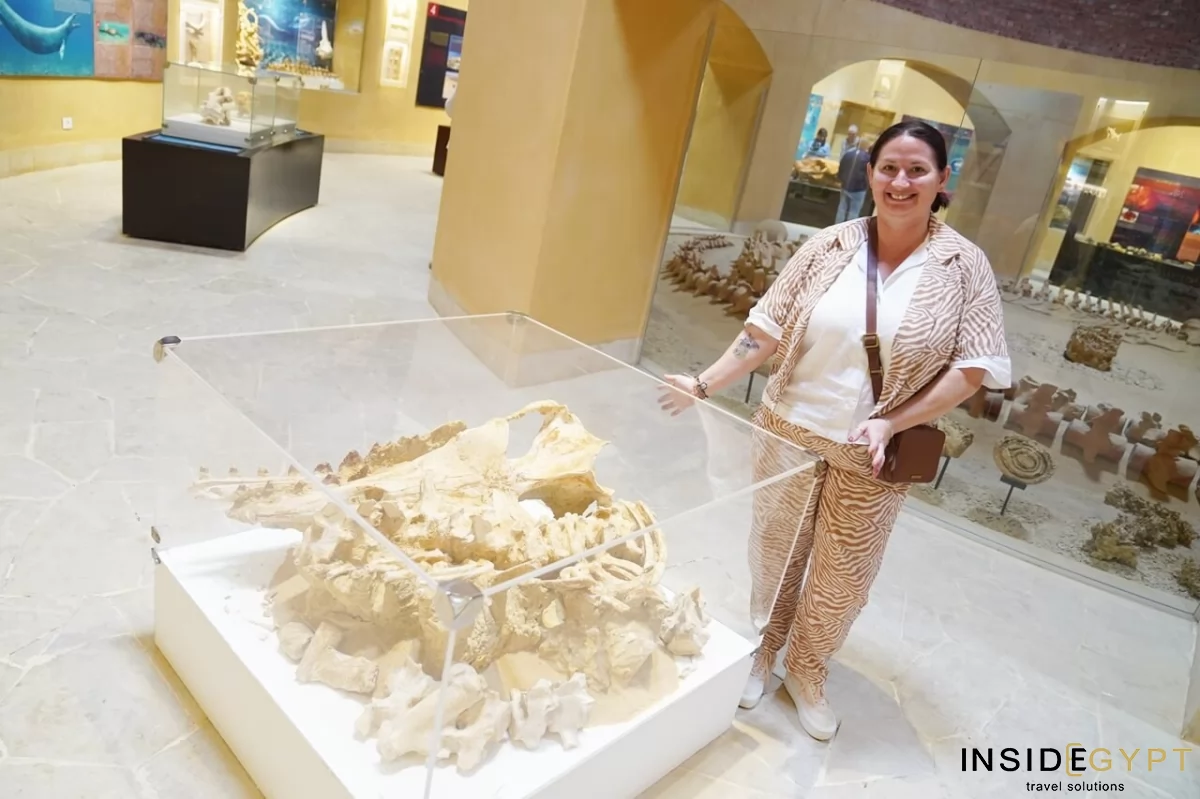
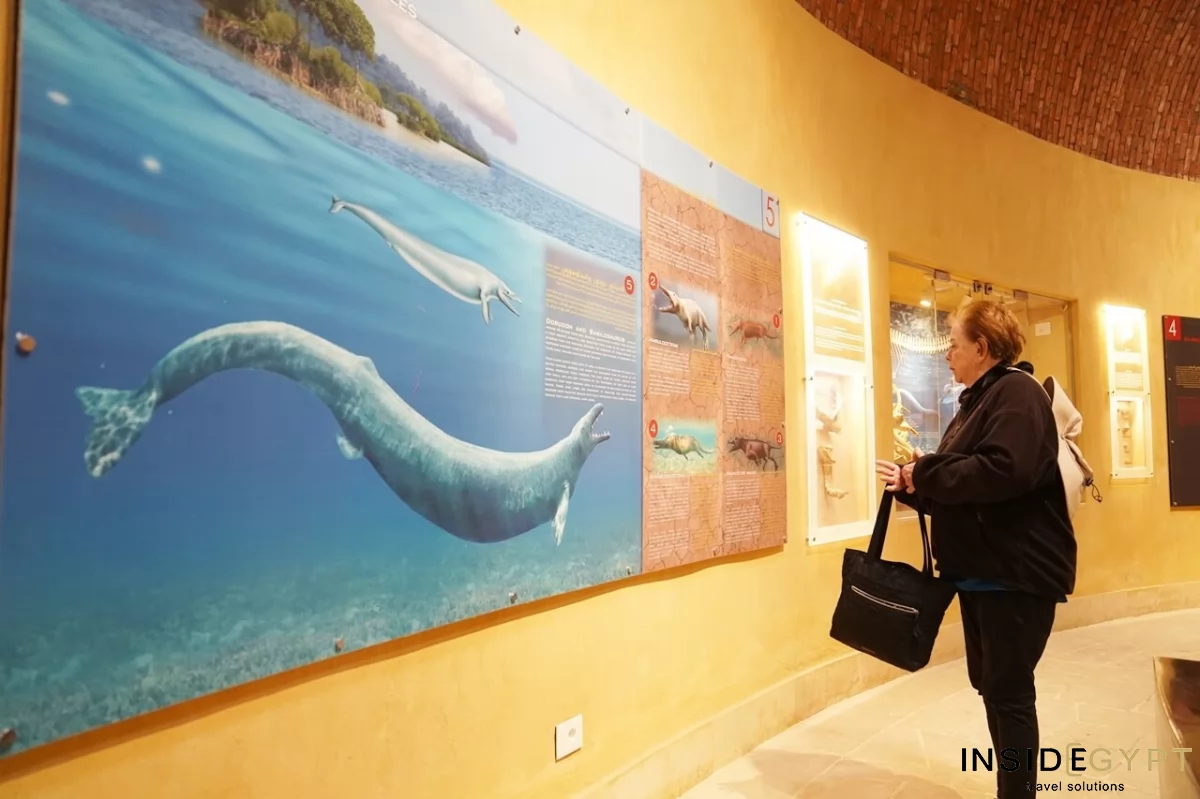
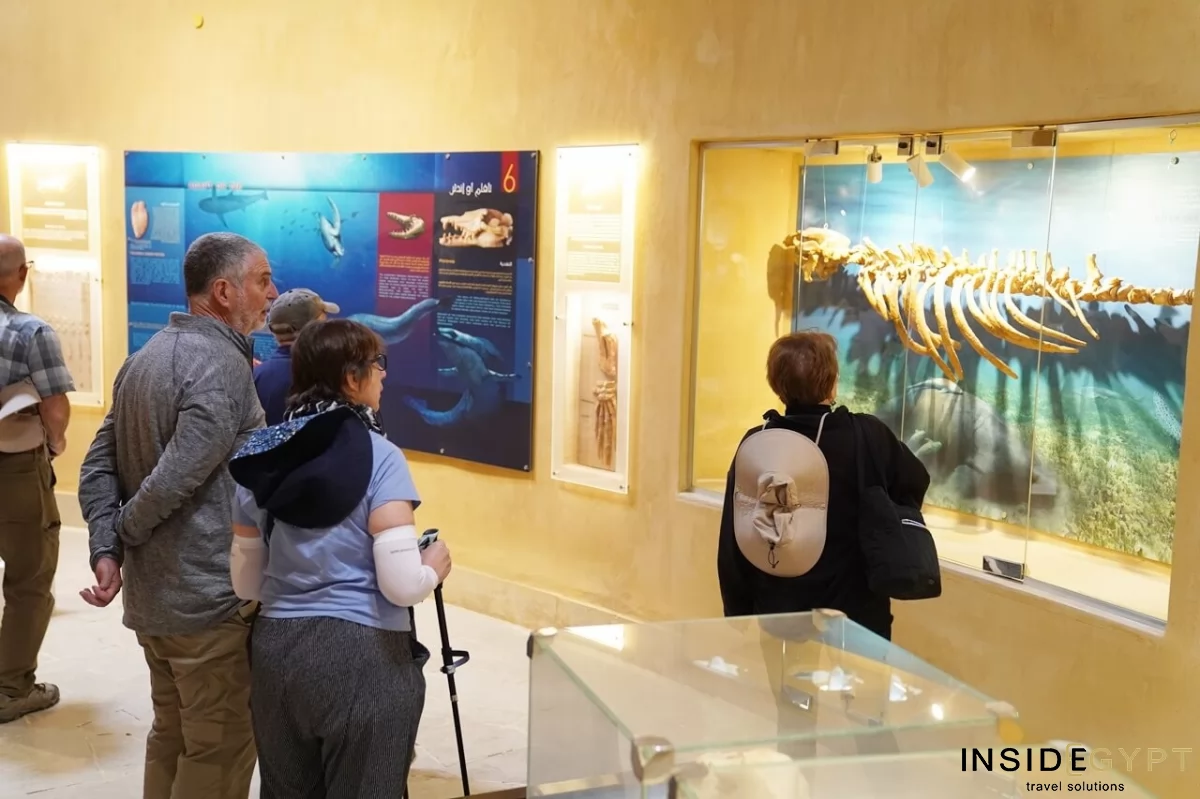
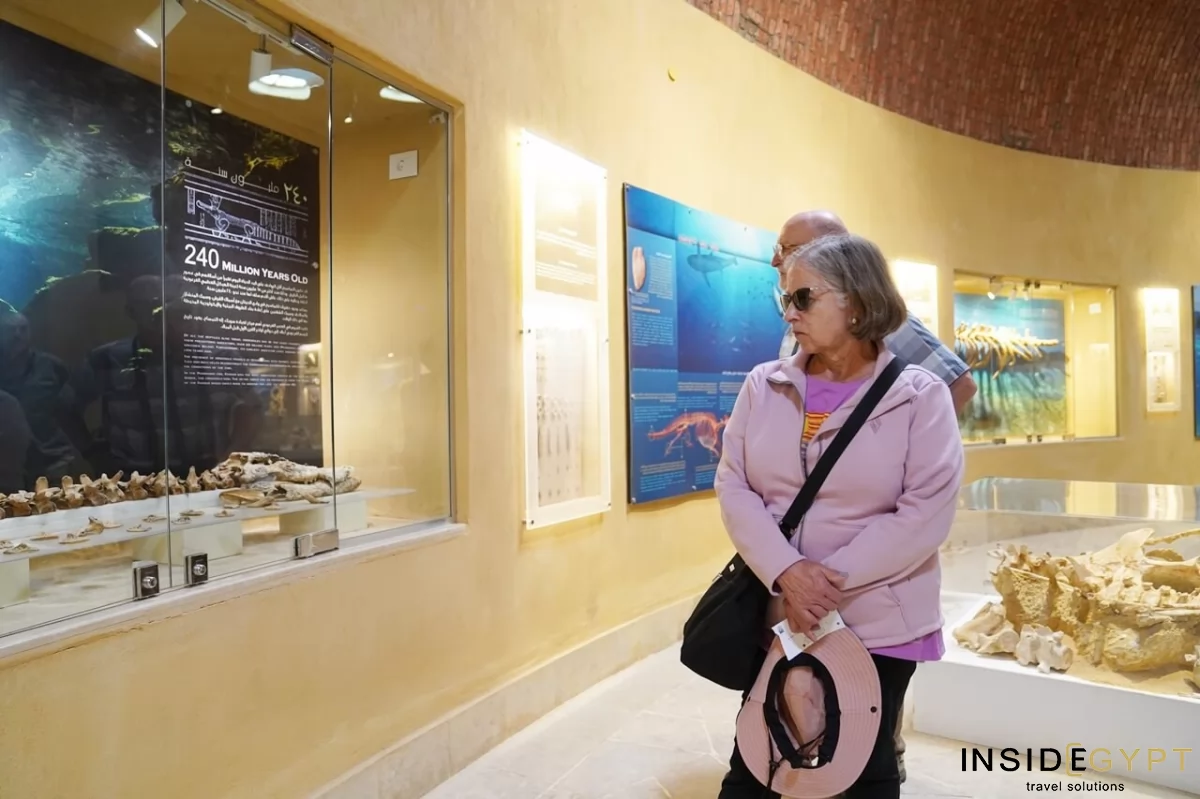
Discover Our Exclusive Egypt Tours
Tour Reviews
FAQs about the Fossil and Climate Change Museum
Is the Fossil and Climate Change Museum visited as part of a guided group tour?
Yes, the Fossil and Climate Change Museum is visited as part of a guided group tour, not as an independent stop. The museum visit is carefully integrated into group itineraries to provide scientific and historical context before exploring the fossil trails of Wadi Al Hitan.
During the guided visit, professional guides explain the significance of the whale fossils, Earth’s climate history, and the evolutionary transition from land mammals to marine life. This structured approach ensures visitors fully understand the scientific importance of the site and its UNESCO World Heritage status. Rather than self-guided wandering, the museum experience is designed to be educational, engaging, and directly connected to the surrounding landscape, making it a key learning component of group tours through Wadi Al Hitan.
How does a group visit to the Fossil and Climate Change Museum usually work?
A group visit to the Fossil and Climate Change Museum typically begins as part of a one-day trip to Fayoum, organized from Cairo. The group travels by coach to the Fayoum Oasis, then switches to 4×4 jeeps for desert access within the protected area.
Upon arrival at the museum, a licensed guide leads a structured visit, explaining the geological history of the region, the Eocene whale fossils, and the link between ancient climate change and modern environmental challenges. After the museum, the group continues to the fossil trails of Wadi Al Hitan, where the museum’s context enhances the outdoor experience. The itinerary usually continues to Magic Lake and the Fayoum Pottery School, creating a well-paced, fully guided educational day rather than independent exploration.
How much time do group tours spend at the Fossil and Climate Change Museum?
Group tours typically spend 45 minutes at the Fossil and Climate Change Museum, making it an easy and well-paced stop within a broader itinerary. The visit begins with a short introductory film in English, offering clear context on paleontology and the region’s role in understanding climate change. After the film, guests explore the museum exhibition, which explains fossil formation, ancient ecosystems, and long-term environmental shifts.
Time inside the museum is intentionally balanced with the outdoor fossil trails, allowing groups to connect the indoor interpretation with real fossil sites in the surrounding landscape. This structure keeps the visit engaging without feeling rushed and fits smoothly into half-day or full-day programs.
What is the difference between the museum and the outdoor fossil trails at Wadi Al Hitan?
The experience at Wadi Al Hitan is split between two complementary elements: the Wadi el Hitan Museum and the open-air fossil trails.
The Fossil and Climate Change Museum, Egypt is an indoor, interpretive space. It introduces visitors to whale evolution, ancient environments, and climate history through a short film and curated exhibits. This setting provides essential scientific context before heading outside.
By contrast, the open-air fossil trails allow travelers to walk through the desert landscape where fossils remain exactly where they were discovered. Here, guests see full whale skeletons embedded in rock, experiencing the scale and authenticity of the site firsthand. Together, the museum explains the story, while the trails bring it vividly to life.
Is the Fossil and Climate Change Museum suitable for seniors?
Yes, the Fossil and Climate Change Museum, Egypt is generally suitable for seniors, especially when visited as part of a guided group tour. The Wadi el Hitan Museum itself is indoors, with flat floors, short walking distances, and places to pause, making it comfortable for older travelers.
Outdoor walking is optional and can be adjusted to individual ability. The fossil viewing areas are spread out but do not require strenuous hiking, and groups can choose shorter sections of the trails. Importantly, Inside Egypt schedules tours during autumn, winter, and early spring, when temperatures are mild and not overly hot.
With proper pacing, shade breaks, and flexible routing, the visit is manageable and rewarding for senior guests interested in history and nature.
Are guides included during group visits?
Yes, professional guides are included during group visits and play a key role in shaping the experience at Wadi Al Hitan. Guides accompany groups inside the museum and across the fossil sites, helping visitors understand the scientific importance of the fossils, ancient marine life, and long-term climate history.
They interpret complex topics, such as whale evolution, environmental change, and desert formation, in a clear, engaging way suitable for all ages. Guides also explain why the site is recognized as a UNESCO World Heritage Site, highlighting its global value and conservation rules.
For group travelers, having a guide ensures the visit is structured, informative, and respectful of the protected landscape, turning what could be a simple walk-through into a meaningful learning experience.
What should group tour participants know before visiting the museum?
Before visiting the museum and fossil sites at Wadi Al Hitan, group tour participants should come prepared for a desert environment. Wear comfortable walking shoes, as paths are sandy and uneven, though not strenuous. Lightweight clothing, a hat, sunglasses, and sun protection are essential, even in cooler months. Bringing water is strongly recommended.
Visitors must follow conservation rules: fossils must not be touched, climbed on, or removed, as the site is strictly protected. Staying with the group and listening to the guide helps keep the visit smooth and respectful.
Facilities are limited, so plan ahead. Many itineraries combine the visit with nearby natural sites such as Wadi El Rayan, making pacing and cooperation within the group especially important for an enjoyable day.
